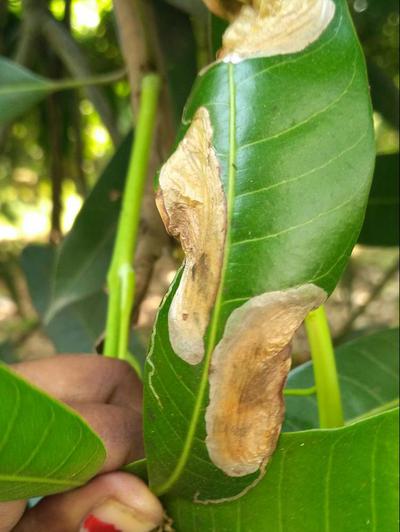Cashew Leafminer
Acrocercops syngramma
Insect
In a Nutshell
- Mining of mango leaf surfaces and tender shoots. Burnt markings on fresh leaves. Blistered grayish-white patches on leaves which later become big holes.
Can also be found in
Symptoms
Early signs of attack are seen as mining on young leaves by the larvae. The larvae feed on the leaf tissues leaving the epidermal layers untouched. Whitish, blistered patches then appear on the leaf surface where several mined portions merge. Damage is seen as large holes in old, mature leaves. This caused by the drying and crumbling of mined portions of the leaf.
Recommendations

Organic Control
Use parasitic wasps such as Diglyphus isaea, which parasitizes leaf miner larvae, killing them before they can pupate. Utilize organic fertilizers to maintain plant health. Prevent adult miners from laying eggs on leaves by using floating row covers. Yellow or blue sticky traps can be used to catch egg laying adults. The soil under infested plants should be covered with plastic mulches to prevent larvae from getting to the ground and pupating. A concentrated spray of Neem oil and cypermethrin disrupts the growth and development of pest insects.

Chemical Control
Always consider an integrated approach with preventive measures together with biological treatments, if available. Spray Monocrophos 36 WSC 0.05% (@ 0.5ml/lit). Fast-acting botanical insecticides should only be used as a last resort.
What caused it?
Damage is caused by the larvae of leaf miners. Eggs are laid on tender leaves by the silvery grey adult moth. Before maturation, the larvae are usually dull white and later turn pinkish or reddish brown. Larvae fall off to the soil to mature and emerge after 7-9 days. The total life cycle can vary between 20 to 40 days. The damage reduces the ability of the plants to photosynthesize, causing a massive loss in production because the leaves dry out and fall off.
Preventive Measures
- Monitor plant leaves closely and early in the season to allow early action.
- Pick off and destroy severely-infested leaves in small gardens.
- Practice proper watering to allow plants resistant and tolerant to plant damage.



